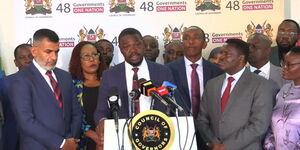In a renewed crackdown on irregular water connections, the government is now targeting informal settlements and carwash businesses, which are notorious for the vice.
This follows a raid on the morning of Wednesday by a team from the Nairobi City Water and Sewerage Company (NCWSC) who carried out a targeted operation in the Dagoretti area.
From the operation, the officials discovered three carwash businesses that were operating their trade through illegal water connections. The businesses were operating along Muhuri and Kikuyu Roads.
Further, NCWSC also closed in on an unauthorised water pipeline which was supplying water to an informal settlement in Ruthimitu. The unlawful pipeline is also believed to be supplying water to other businesses besides the carwashes.
Nairobi County also called on the public to report any irregular connections since continued operations of such connections directly affect the water supply in the larger Nairobi area.
The issue of unlawful water connections has been a pain for the Nairobi County government, which is already grappling with shortages. The city's current water supply stands at 525 million litres a day, which is a far cry from the estimated 900 million litres of water a day, which is the ideal figure to sustain Nairobi's daytime population of seven million people.
In March, President William Ruto revealed plans for the Northern Water Collection Tunnel to start supplying water to the city in a move tipped to bring relief to millions of Nairobi residents.
However, with the prevalent trend of unlawful connections, the increasing supply through the 11.8km raw water transfer tunnel, which was completed in 2024, may not be enough.
NCWSC attempted to solve the issue amicably by announcing a waiver on penalties for residents with water connections that are against the law, on condition that they regularise their water connections by the end of April.
This move came after the discovery that the company lost at least 50 per cent of the water supplied to Nairobi to non-revenue water, which includes losses from connections that are against the law.
The county estimates that out of 560,000 cubic metres of water supplied to Nairobi daily, approximately 300,000 cubic metres are lost due to connections that are against the law and other forms of irregular water tapping.
Part of the reason the county is keen on cracking down on unlawful connections is because of the urgent need to raise revenue from the sector to Ksh20 billion from the Ksh12.8 billion collected in the last financial year.












